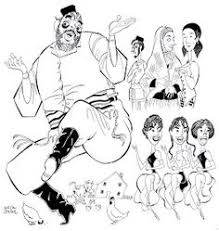
One of the most notable losses to the film world of recent note was the death of Chaim Topol (four days ago). To be sure, Topol received two Golden Globe Awards and was a nominee for both a Tony Award and an Academy Award. He won the most prestigious award in Israel, the Israel Prize, for his performance in Fiddler on the Roof. The play has run 3500 times on the Broadway Stage. Fiddler held the record for the longest-running Broadway musical for almost 10 years until Grease surpassed its run…and yet, there was no mention whatsoever of his death.
With this in mind, a Jewish Telegraph Article (JTA) with the title, “‘Fabelmans’ flops at the Oscars, but Hollywood’s Jewish History Gets a Nod,” caught my eye. The choice of wording is apropos. Jewish films or actors, in seems, are no longer celebrated in Hollywood. They get a “nod” (although Topol didn’t even get that).
The broadcast included a promotional video for the Academy Museum, which opened last year to celebrate the history of Hollywood. In the video, a curator named Dara Jaffe explains that one of the museum’s roles is to “bring important film histories to light, from the Jewish immigrants who founded the Hollywood studios to the early innovators of African-American cinema.” The inclusion is notable because the museum drew steep criticism when it first opened for giving short shrift to the industry’s robust Jewish history; Jaffe was appointed to put together a permanent exhibition about that history in response. The exhibition has not yet opened.
For now on, Jewish history and Jews in Hollywood will only get “nods,” especially the best of them. Just like at the museum in Los Angeles honoring the film industry, where the Jews who founded Hollywood are barely mentioned. David Chappelle and Louis Farakahn think Jews have too much power in Hollywood, so, it’s time to start “nodding” rather than celebrating. That is about all Jews in Hollywood and their history will get. That seems to be the new trajectory.
From recent movies like You People by Jonah Hill, we learn that Jews have too much power and privilege and are no different from spoiled white people with inhereted wealth (more than one generation of wealth, today, is considered a sin by the contemporary race theory ideologues, like Ibram X Kendi).
In this new context, Jews are “white” and don’t deserve anything close to celebration, especially one of America’s top Jewish filmmakers, Steven Spielberg. As the English comedian David Baddiel puts it, today, Jews don’t count. The celebration of Jewish success has been sidelined by the new regime of diversity, equity, and inclusion. The culture industry has moved on to the next “thing.”
An article by Tablet that brought out what this means – in terms of fresh data – is eye opening. It is entitled, “The Vanishing.”
I’ll end with a brief quote from the article which sums up the situation and may help us to understand why Topol wasn’t a focus – since, after all, such a choice may have put too much focus on the Jews and their contributions to American film and theater.
As true believers in the postwar liberal project, American Jews spent decades advocating for tolerance and equality of opportunity, not least because we were the prime beneficiaries. The ADL didn’t fight the quotas in the 1950s so Jews could matriculate in proportion to their percentage of the population. But there’s a tension between meritocracy and representation. The new DEI regime treats any disparity between groups as evidence of unfair advantage—and yet we’re supposed to think it’s a coincidence that Jewish representation plummets at the exact moment America frantically pushes to racially rebalance all high-status industries.
Because what is framed as a backlash against America’s “white” centers of power is in many cases a clever sleight of hand. Jews are being disproportionately purged from liberal institutions because Jews disproportionately exist within those institutions.
When activists and journalists and executives talk about how Broadway or NPR or publishing is “too white,” what they really mean is “too Jewish.” When The New York Times says it wants to make its internal demographics look more like New York City’s (excepting the Hasidim, of course), what this means is “fewer Jews.” Twenty years ago, if Pat Robertson spoke along these lines—making the same complaints about the same people and industries and institutions—there would have been a rush to condemn it as antisemitic. Today it passes for social justice.
In the 1960s and ’70s, facing hard barriers to their professional advancement, Soviet Jews lost the faith. The children and the grandchildren of the revolution tried to emigrate. When the authorities wouldn’t let them, American Jews rallied to their cause, created brand-new communal organizations, petitioned Congress, rallied thousands-strong outside the United Nations. Ours was a community confident in its power and confident in its future.
Asian Americans have the dignity of looking at admissions practices and demanding fair representation. The Jews, as ever, are a people apart. From civil rights to Vietnam to the spectacular bounty of their cultural and political achievements, liberal Jewish boomers always managed to be on the right side of history. It is a supreme irony that they’ve helped empower a movement that now places their children and grandchildren on the wrong side.
If Putin or Orban reduced their universities’ Jewish populations by 50%, the ADL would be howling. But Harvard and Yale can magically lose nearly half their Jewish students in less than a decade and we’ll take it on the chin. That this is occurring with the full acquiescence of a terrified liberal Jewish establishment should tell you just how much power Jews in America still have.
